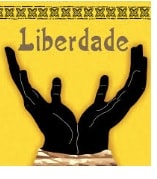History Activity, proposed to students in the eighth year of elementary school, with questions about the abolitionist movement.
This story activity is available for download in an editable Word template, ready to print to PDF and also the completed activity.
Download this activity from:
SCHOOL: DATE:
PROF: CLASS:
NAME:
1) What was the Eusébio de Queiroz law?
A:

With slavery abolished in all English domains, England became the biggest opponent of the international slave trade and the English policy to combat slavery had three explanations main:
I. The English Industrial Revolution resulted in the extraordinary increase in the production of goods. With the end of the traffic in the colonies, the resources that were applied in the purchase of slaves could be invested in the purchase of English products.
II. In the English domains in southern Africa, the sale of slaves to traffickers affected local economic activities that were lacking in labor.
III. In the Spanish Antilles, the end of the traffic forced the owners to employ workers in the sugar mills. The consequence was that Spanish sugar became more expensive than Brazilian sugar, which continued to be produced by slaves.
After reading the above, check the alternativeincorrect.
It is incorrect:
a) ( )I, II
b) ( )II, III
c) ()I
d) ( )III
3) Mark the alternative which consists of the steps of abolitionist legislation in Brazil:
I. Rio Branco Law (Free womb law)-1871- declared free the children of slave women born from that date and the free children would stay with their mothers up to 8 years of age.
II. Saraiva Law - Cotegipe (Sexagenaries Law) - 1885 - freed slaves over 60 years of age, leaving freed slaves obliged, by way of indemnity, to work for their former owners for 10 years.
III. Saraiva Law - Cotegipe (Sexagenaries Law) - 1885 - freed slaves over 60 years old, leaving freed slaves obliged, by way of indemnity, to work for their former owners for 3 years.
IV. Rio Preto Law (Law of the free womb)-1871- declared free the children of slave women born from that date and the free children would stay with their mothers up to 8 years of age.
It's correct:
a) ( )I, III
b) ( )II, III, IV
c) ( )I, III, IV
d) ( )III, IV
4) What economic effects have occurred in Brazil with the end of the slave trade?
A:
5) Discuss what happened to slaves after abolition?
A:
By Rosiane Fernandes Silva
At answers are in the link above the header.
 report this ad
report this ad